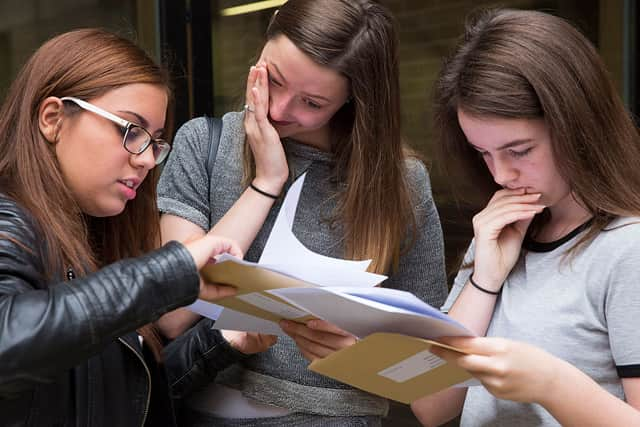GCSE and A-level exam results must return to pre-pandemic levels to carry ‘credibility’, says schools minister
and live on Freeview channel 276
GCSE and A-Level exam results must return to pre-pandemic levels this year to ensure qualifications carry “weight and credibility” with employers and universities, the schools minister has said.
Nick Gibb also said there is an “expectation” that extra support for pupils offered this summer, such as equation sheets in GCSE maths and science exams, would not be used next year. These ‘exam aids’ were introduced to acknowledge the disruption to learning caused by Covid-19, and, more recently, by teacher strikes.
Advertisement
Hide AdAdvertisement
Hide AdThe Tory MP’s comments come after record GCSE, AS, and A-level grades were achieved in 2020 and 2021, when students were not able to sit exams ‘normally’ and were instead given marks based on assessments by their teachers. In 2022, results fell alongside the return of the exams - but they were still higher than usual.
This summer though, according to Ofqual, is the first since the pandemic in which results are expected to be comparable to 2019. A-level students are due to receive their marks on 17 August, while GCSE pupils will find out how they did a week later, on 24 August.
Speaking to PA ahead of the ‘Results Days’, Mr Gibb said: “It is important to get back to normal because we want these qualifications to continue to carry the weight and credibility both with employers and with universities and colleges that they need to have. Every year that elapses is a year away from the disruption caused by the pandemic and there are more years that those young people have had in school full time.”


He continued: “A typical student in 2019 – given the same level of ability and the same level of diligence – the likelihood is that same student would get the same grades in 2023 as they would have done in 2019.”
Advertisement
Hide AdAdvertisement
Hide AdHowever, other education leaders have suggested it is too soon to expect students to return to pre-pandemic levels, pointing out that this cohort (and the next) still had their learning disrupted by the pandemic - and had to deal with the impacts of ongoing industrial action. while also dealing with missing lessons and teaching as a result of industrial action.
Geoff Barton, general secretary of the Association of School and College Leaders (ASCL), said: “While we understand the appetite to fully return to normal from next year onwards, there are many future exam cohorts that have had part of their education disrupted by the pandemic. It is important this is recognised when making decisions in future years.”
Meanwhile, Sarah Hannafin, head of policy for school leaders’ union the National Association of Head Teachers (NAHT), added: “Employers, universities, and colleges are more than capable of understanding changes to approaches in grading and making appropriate changes to their own processes – as we saw when exams were cancelled.”
“A narrow focus on returning to pre-pandemic levels misses opportunities to reflect, review, and improve on what we had before,” she added.
Advertisement
Hide AdAdvertisement
Hide Ad

Responding to these concerns, Mr Gibb reassured parents and students that there would be “additional protection” for those taking GCSEs and A-levels this year, whereby grade boundaries will be altered if examiners find evidence of a national drop in standards in comparison with 2019.
However, by next summer, the MP for Bognor Regis and Littlehampton said he expects “the system to be back fully”. He added there is an “expectation” that things such as exam aids, which were intended as a “temporary expedient” for this year, will no longer be available - but admitted a final decision is still yet to be made.
Mr Gibb was also asked about possibly delays to results for vocational technical qualifications (VTQ) this year, after thousands of students were left in limbo last summer when nearly 21,000 grades from awarding bodies Pearson and OCR were delayed or had errors.
Commenting on this, he said: “You can’t predict anything about exam results – whether it’s the academic side or the vocational side – but certainly we have done everything, and the regulator has done everything they can to make sure that there aren’t those delays because they were unacceptable last year and we don’t want to see it happening again this year.”
Advertisement
Hide AdAdvertisement
Hide AdDr Jo Saxton, the chief regulator of Ofqual, which launched an action plan last year to help make sure students receive their VTQ results on time this August, added: “I expect the number of late results will be significantly lower than last year because of the actions we’ve taken.”
Speaking on GCSE, AS, and A-levels, she continued: “With 16 million GCSE, AS and A-level scripts now in the final stages of marking, nationally we are expecting results to be similar to before the pandemic. Grade protections have been built in to reflect that performance is likely to be a little weaker because of the disruption that students experienced.
“This return to normal is an important milestone, and while overall results will be lower than last year, students can have confidence that their grades will reflect what they know and understand and will help them make the right choice about their next step - whether that’s further study or moving into the world of work.”
England, Wales, Scotland and Northern Ireland offered different levels of support to students who took exams this year - and the approaches to are set to vary.
Advertisement
Hide AdAdvertisement
Hide AdIn both Wales and Northern Ireland, exam regulators said they do not plan to return to pre-pandemic grading until 2024. Meanwhile in Scotland, the Scottish Qualifications Authority (SQA) said it plans to take “a sensitive approach” to grading this summer, in order to take into account the ongoing impact of the pandemic on education.
Comment Guidelines
National World encourages reader discussion on our stories. User feedback, insights and back-and-forth exchanges add a rich layer of context to reporting. Please review our Community Guidelines before commenting.
